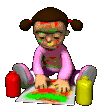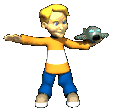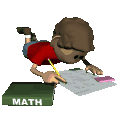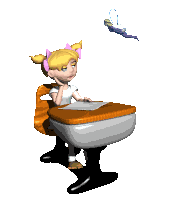

What were you like as a child?
Where did you live?
What sorts of things did you eat? Drink?What did you do in school?Where did you go after school?What did you and your friends do on the weekends?

In order to answer these questions, you would use what is called the "imperfect" tense. You should know the name of the tense so that you can properly identify it when doing certain activities, otherwise its name is relatively unimportant for now. The imperfect tense is the easiest (I believe) of all the tenses in Spanish. There are some simple rules to follow, and there are neither stem-changes nor spelling changes. In fact there are only three irregular verbs, and they are listed below.
So,
what do we do to form this tense?
Drop the infinitive ending (AR,
ER or IR)
and add the appropriate ending. There are two sets of endings, one
for AR verbs, and one for ER/IR verbs.

This should give you
a handle on the vocab, and also give you a good idea what one of the uses
of this tense will be.
actuaba (rabiosamente)
aprendía cosas nuevas
asistía a una guardería
bebía leche chocolate
chapoteaba en los charquitos
cocinaba pasteles de barro
coleccionaba cosas extrañas
coloreaba
columpia en los árboles
comía caramelos
contaba chistes
deslizaba en el rebaldero
desobedecía a (los padres)
dibujaba en la pared
dormía con un osito de trapo
era (alto)
(me) escondía debajo de la cama
esquiaba
fingía ser (astronauta, médica, bombero, etc.)
gimoteaba
gritaba
hacía preguntas
hacía pi-pi en los pantelones
iba a (la casa de un amigo)
jugaba con (muñecas)
jugaba en el parque de recreo
leía cuentos de hadas
lloraba
mentía
miraba muchas películas
molestaba a los otros niños
montaba el trineo
montaba a caballo
nadaba
obedecía a los profesores
pedía el por qué simpre
peleaba contra los otros niños
pintaba con los dedos
ponía cosas en la nariz
robaba bizcochitos
rompía cosas
saltaba la cuerda
soplaba burbujas
subía los árboles
tenía luchas de piedras
tenía rabietas
tiraba piedras
tocaba el piano
torturaba a los animales
veía el Plaza Sésamo

Y/O
Now, choosing from the list above, or using your own vocabulary, answer the following questions based on what you used to do when you were a child.Cuando eras niño....
- ¿Qué hacías en las clases?
- ¿Qué comías?
- ¿Qué hacías con tus amigos?
- ¿Qué bebías?
- ¿Qué hacías después de las clases?
- ¿Qué hacías los fines de semana?
List your favorite ten and least favorite ten activities that you used to do.
Practice the irregulars:

It's important that you
be able to take this tense beyond the vocabulary above, so I recommend
lots of verb drills, and you can do these online. Click on the following
links to practice. At these sites, practice and quiz yourself.


Now, reflect a little
bit based on what you have studied.
You
(should have, anyway) used this tense and the vocabulary here to talk about
the activities you used to do.
In other words, you used it to describe what you were like and what you
did on a somewhat regular basis. You DID NOT use it for telling about
specific events, right? This is important!
The imperfect tense, used this way is the English equivalent to "used to". This is expressed in English in a few ways. Hablaba español en clase = "I spoke Spanish in class." Or it could mean, "I would speak Spanish in class." And of course it could mean "I used to speak Spanish in class", which is the true meaning of the tense. Basically, if you can say "used to" for the verb, it will be imperfect.
Look at the following
and see if you would or would not use the imperfect tense for these sentences:
The
imperfect tense is used to describe how things were and what used to happen.